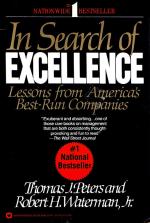In Search of UGC Excellence
[This post is part of a 4 part series on the key tensions in growing a high quality community-generated content site. It was presented at PubCon, Las Vegas, 2011]
I happened to pick up my (nearly) 30-year-old copy of In Search of Excellence while preparing my PubCon presentation on High Quality UGC.
A few points stood out:
- Commit to excellence. If your community is committed to excellence, and believes you are too, you’ll have a much greater chance of achieving high quality. Wikipedia and Stack Overflow have this. Most sites seem committed to just good enough. At best.
- There’s no “How To” manual for excellence. The authors point out that all they can do is provide success stories, insight, and inspiration. If you’re looking for “The 10 rules for creating excellence” look elsewhere (and good luck with that).
- Attract tiny contributions. They quote a study that 95% of people asked to put a big traffic safety sign on their front yards said no (unsurprisingly). But if they got them to put a small sign in their window, then half of those people later said yes to the big sign. I heard the same idea expressed at WikiMania. Contributing to Wikipedia is like a box of Pringles, they said, once you start you can’t stop. And ‘Edit’ was too high an initial barrier, so they instituted Article Ratings, mostly to get newcomers to make a tiny contribution that could lead them to larger ones later. (I hope it worked).
- Man is a social creature. Too many people believe the false dichotomy that you’re either a for-profit capitalist entity that focus solely on money, return on investment and the bottom or you’re a soft-hearted liberal who leans towards socialism. In Search of Excellence presented the case that free enterprise, for-profit companies thrive most when they focus on people (employees) serving people (customers). Community sites take this one step further with customers serving customers.
- I’ve recently read a slew of books (such as Predictably Irrational, Freakonomics and Drive) that cite the behavioral economics work that won Kahneman and Tversky a Nobel Prize in 2002. I was surprised to see that In Search of Excellence quoted Kahneman and Tversky 20 years before they were awarded the Nobel Prize. The main point is that if you start with the idea that man is a rational economic actor you’re going to have a very flawed idea of how to run a successful business.
You can reject In Search of Excellence’s argument that most businesses should focus more on people and their need for meaning and excellence. But if you’re running a community site you should probably give their arguments your full attention. You can’t use monetary or authoritarian management techniques. If you’re running a community site, you need to focus on giving your people the non-monetary rewards they need, such as respect, appreciation, and the opportunities to help others and to pursue excellence.
UGC: Tribal Elders and Noobs
November 28, 2011 @ 6:55 am
[…] In Search of UGC Excellence […]
UGC: Starting and Scaling
December 6, 2011 @ 11:47 am
[…] In Search of UGC Excellence […]
UGC: Social Context & Market Context
December 6, 2011 @ 12:14 pm
[…] In Search of UGC Excellence […]